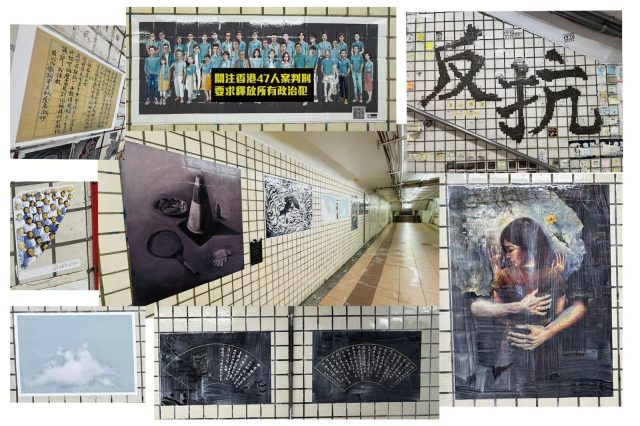Hong Kong’s Lennon Walls, which transformed public spaces into canvases for democratic expression, became iconic features of the city’s pro-democracy movement.

Exiled Hong Kongers are looking to revive the city’s famed Lennon Walls in Taiwan to serve as powerful reminders of a democracy movement that Beijing has sought to erase, even as no commemorative events were allowed in their home soil to mark the sixth anniversary of Hong Kong’s massive anti-extradition protests.
“The Lennon Wall is an important collective memory for us (Hong Kongers),” said Hong Kong artist Kacey Wong, who moved to Taiwan’s Taichung city in 2021. “From 2014 to 2019, it was the place where we spread our democratic demands. Now the Lennon Wall and democracy and freedom in Hong Kong are gone.”
Hong Kong’s Lennon Walls – named after musician John Lennon’s peaceful activism and inspired by Prague’s Velvet Revolution of the 1980s – became iconic features of Hong Kong’s pro-democracy movement, transforming public spaces into canvases for democratic expression.
Filled with colorful displays of sticky notes, posters, artwork, and messages such as “We Hong Kongers never give up”, Hong Kong’s Lennon Walls allowed ordinary citizens to express their political views and demonstrate their solidarity.
Lennon Walls sprouted on available public spaces across Hong Kong, including underground tunnels and on pillars outside railway stations, during the 2014 Umbrella Movement and again in 2019, during the anti-extradition movement when millions took to the streets to protest a proposed legislation that would allow criminal suspects to be extradited to mainland China.
In Taiwan, the Lennon Wall in Taichung’s pedestrian underpass is the only such publicly accessible wall in the region, and Hong Kong exiles in the democratic island are keen to preserve it, even as they look to establish more such walls, including one in capital Taipei.
Among them is Wong, who with his friends on Thursday marked the anniversary of the anti-extradition movement with a visit to the Lennon Wall in Taichung and sang before it the protest anthem of the 2019 pro-democracy protests, “Glory to Hong Kong.”
Earlier this year, part of the Lennon Wall in Taichung was reportedly cleared during a regular cleanup and maintenance of the underpass by volunteers. This prompted a statement from city officials who said they respect the wall as a symbol of public expression and that any future cleaning must be reported in advance.
Wong now leads efforts to preserve and refresh the display on the Lennon Wall in Taichung, particularly in the cleared sections, viewing it as both an act of commemoration and resistance.
“Crisis brings opportunity. As a curator, I want to turn the cleaned sections into art spaces,” said Wong, who comes to the Lennon Wall in Taichung every week and pays out of pocket to reprint and post high-quality artworks.
“If someone tears it down again, I’ll repost it — just like we did during the 2019 protests. That persistence is the resilience of resistance,” he said.
Another Hong Kong exile Fu Tang is currently looking for a location in Taipei to establish a permanent Lennon Wall in the city. He believes that protecting these spaces represents core Taiwanese values too.
“The Lennon Wall represents the right to freedom of expression of diversity and tolerance,” Fu said. “Protecting the Lennon Wall is not only about protecting the freedom of expression of Hong Kong people in Taiwan, but also about protecting the important values of peace and tolerance in Taiwan.”
Fu believes the establishment of a permanent Lennon Walls in Taiwan will also serve as reminders for the Taiwanese people to cherish their existing freedoms. “It also tells the world that Taiwan is not part of China, because there is no room for Lennon Walls in China,” added Fu.
Taiwan, which China claims as its territory, has welcomed Hong Kong refugees through various humanitarian programs, and many Hong Kongers who participated in the 2019 anti-extradition protests have now made the democratic island their home.
Among them is Tsai Chih-hao, who was one of the protestors who stormed Hong Kong’s Legislative Council in 2019.
“As a protester, I am very happy that I can still see the Lennon Wall in Taiwan,” Tsai said. “There are still people willing to maintain it and allow people who come to Taiwan to visit it. This means that there are still people who remember the 2019 anti-extradition movement and the efforts made by the people of Hong Kong for democracy.”
Edited by Tenzin Pema.
Source: Copyright © 1998-2016, RFA. Used with the permission of Radio Free Asia, 2025 M St. NW, Suite 300, Washington DC 20036. https://www.rfa.org.












